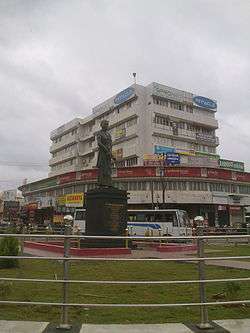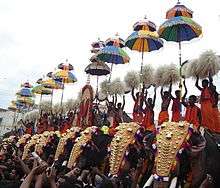Sakthan Thampuran
| Shakthan Thampuran | |||||
|---|---|---|---|---|---|
| Maharaja | |||||
 Sakthan Thampuran statue in Sakthan Thampuran Nagar in Thrissur city | |||||
| King of Cochin | |||||
| Reign | 16 August 1790 - 26 September 1805 | ||||
| Coronation | 1791 | ||||
| Predecessor | Rama Varma VIII | ||||
| Successor | Rama Varma X | ||||
| Born |
26 August 1751 Vellarapally Palace, Puthiyedam, Kaladi | ||||
| Died |
26 September 1805 (aged 54) Thrissur City | ||||
| Burial | Thrissur City | ||||
| Spouse | Chummukutty Nethyar Amma | ||||
| |||||
| Malayalam | രാജാ രാമ വര്മ്മ | ||||
| House | Cochin royal family | ||||
| Father | Chennose Namboodiripad | ||||
| Mother | Ambika Thampuratti | ||||
| Religion | Hinduism | ||||
Rama Varma Kunhjipilla Thampuran (1751–1805), or Rama Varma IX, popularly known as Sakthan Thampuran (Sakthan meaning powerful), was the ruler of the Kingdom of Cochin. He was the King of Cochin and his palace was in Thrissur City. City of Thrissur is the Cultural Capital of Kerala and Sakthan Thampuran is the very architect of City of Thrissur. Thrissur Pooram was also introduced by him.
Biography
Early life
Born on Karkidakom, 926 (ME) (August 26, 1751 AD) at Vellarapally Palace to Anujan Namboodiripad of the Chennamangalam Mana and Ambika Thampuratti of the Cochin Royal Family.[1] His mother died when he was only three years old. The prince was brought up by his maternal aunt, famously known as Chittamma (meaning mother's younger sister) Thampuratti. His early education took place under the tutelage of scholars such as Kallenkara Pisharody. Sakthan Thampuran was a very powerful Maharaja as his name indicate. [2] [3]
Marriage
Thampuran married twice. His first wife was a Nair lady from the reputed Vadakke Kuruppath family of Thrissur whom he married when he was 30 years old. He is said to have had a daughter from this first wife. However, this Nethyar Amma (title of the consort of the Cochin Rajah) died soon after an unhappy marriage. Thereafter the Thampuran remained single for a few decades, marrying again at the age of 52. The second wife of the Thampuran was Chummukutty Nethyar Amma of the Karimpatta family and was a talented musician and dancer of Kaikottikalli. She was 17 at the time of her marriage with the Thampuran. This marriage was without issue and within 4 years the Thampuran died. In those days the widowed Nethyar Ammas did not have any special provisions from the state and hence Chummukutty, at the age of 21, returned to her ancestral home.[4]
Death
After his 55th birthday Sakthan Thampuran fell ill and died in Kanni 11, 980 (ME) (September 26, 1805 AD), at Thrissur City. He was buried in Shakthan Thampuran Palace, Thrissur. His palace in Thrissur City is preserved as a monument and he was responsible for developing the Thrissur City and also making it the Cultural Capital of Kerala. [5]
Administration
After Thampuran ascended the throne of Cochin, he crushed the power of the feudal chieftains and consolidated the royal power. At that time temples were controlled by Namboodiri community, called Yogiatiripppads. The Yogiatiripppads was elected from different temples in the Thrissur District. Thampuran wrested the control of the temples and banished the system of Yogiatiripppads. Thampuran was strict and merciless with criminals which earned his name, Sakthan. British authorities enjoyed a good relation with Thampuran. He was also a personal friend of Dharma Raja of Travancore.
Legacy
City of Thrissur

.
The modern day town of Thrissur owes its origin to Sakthan Thampuran. The reason for his love of the town arose from the fact that his two wives were both born here. They belonged to the Kuruppath and Karimpatta families of Thrissur.[6] Sakthan Thampuran transferred his capital from Thrippunithura to Thrissur to found the modern city. He cleared the 60-acre (24 ha) teak forests around the Vadakkunnathan Temple and developed the Thekkinkadu Maidan, which is now at the heart of the city. After clearing the forest, he built a circular concrete road now known as Swaraj Round.
Thrissur Pooram
The Thrissur Pooram or "Mother of all Poorams", as it was known, was the brainchild of Sakthan Thampuran. In those days Arattupuzha Pooram was the largest temple festival in Kerala. The participants in Thrissur Pooram were regular participants in this pooram. Once they were denied entry to Arattupuzha Pooram because they were late. All the late participant temples went to Sakthan Thampuran, then Maharaja of Cochin, and complained about this bias. Thampuran invited all these temples to bring their deities to Thrissur and pay obeisance to Lord Shiva, the deity of the Vadakkunnathan Temple. Thampuran classified the participants into two groups, the Western and the Eastern. The Western group consisted of the Thiruvambady, Kanimangalam, Laloor, Ayyanthole, and Nethilakkavu temples while the Paramekkavu, Karamukku, Chembukavu, Choorakottukavu and Panamukkamppilly temples came under the eastern group.[7]
Shakthan Thampuran Palace
Named after Shakthan Thampuran, the palace is spread over 6 acres (2.4 ha) of Thrissur and was earlier known as Vadakkechira Kovilakam. It is one of the historic, cultural, architectural important palace of the erstwhile Maharaja of Cochin, which has now been converted into a heritage museum. This palace is a blend of traditional Kerala and Dutch architectural styles following its 1795 reconstruction.

See also
References
- Sources
- Notes
- ↑ "SAKTHAN THAMPURAN AND THE EMERGENCE OF COCHIN AS A COMMERCIAL CENTRE" (PDF). Saritha Viswanathan. Retrieved 2013-07-11.
- ↑ "Kerala Celebrities". Kerala.com. Retrieved 2013-03-11.
- ↑ "HH Maharaja Rama Varma Shakthan Thampuran, Cochin". Geni. Retrieved 2013-03-11.
- ↑ "Kerala Celebrities". Kerala.com. Retrieved 2013-03-11.
- ↑ "Kerala Celebrities". Kerala.com. Retrieved 2013-03-11.
- ↑ The Chaldean Syrian Church Of The East. Mar Aprem. Retrieved 2013-03-11.
- ↑ "Thrissur Pooram - Prologue". Thrissurpooramfestival. Retrieved 2013-04-02.
| Wikimedia Commons has media related to Sakthan Thampuran. |
| Regnal titles | ||
|---|---|---|
| Preceded by Rama Varma VIII |
Maharaja of Cochin 1790–1805 |
Succeeded by Rama Varma X |